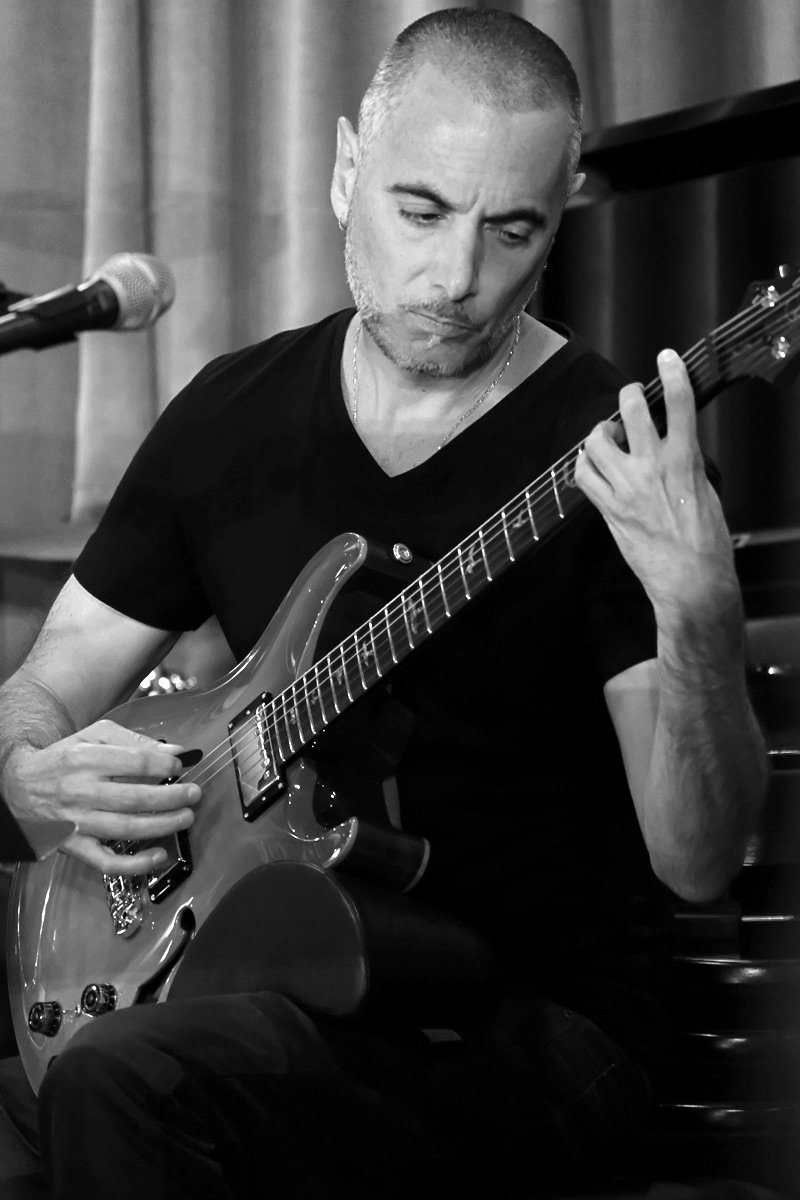
George composed this song with my voice specifically in mind. For many years I sang it wordlessly, vocalizing the challenging, angular melody like an instrumentalist. During lockdown, as lyrics poured out of me, I connected to the song more intuitively. On opening, the voice emerges out of nowhere—direct, compelling, unexpected, vulnerable.
Witch Touch
Into another land,
free, finally, from all the pain, inside me
Waking to the sound of rain
or is it that I’m still dreaming?
A million shadows lurking in
Mental visions keep on streaming
Here I am, the same old place
Fever dream my body’s tossing
and in a flash I see her face
waving hand, I must be crossing
Into another land,
free, finally, from all the pain, inside me.
I’m waking to the sound of rain
Here I am, the same old place
Fever dream, my body’s tossing
and in a flash, I see her face
waving hand—A waving hand
I’m in another land,
free, finally, from all the pain,
free, finally, from all the pain,
here, in this waking reverie free,
and I see her hand again,
near, wiping all my tears away,
clear vision of my mind, unchained
free, finally, from all the pain,
inside me.
How Deep Is the Ocean?
I fell in love with this song in my twenties, listening to Peggy Lee with the Benny Goodman Orchestra. As George never fails to point out to me, I share Irving Berlin’s Yiddish penchant for answering a question with another question. Berlin’s only statement in this song is the simple “I’ll tell you no lie.” Mauricio’s Brazilian groove is a spontaneously upbeat celebration; the melody, in contrast, evokes yearning.

ZINGARO
(Retrato em Branco e Preto)
I’m familiar with each step along this road
I know it goes nowhere
I know its secrets by heart
I’m familiar with the stones in the path
And I know, too, that there, alone,
I’m going to end up so much the worse
What can I do to fight the enchantment
Of this love that I deny so much, I avoid so much
And that, nevertheless, always recasts its spell
With its same sad old facts that, in a picture album, I insist on collecting
Here I go again, like a fool, seeking the despondency
Of whose acquaintance I’ve grown weary
New sad days, sleepless nights
Verses, letters, my dear
And still I write to you again, to tell you this is a sin
My breast is so scored with memories from the past
And you know the reason
I’m going to collect one more sonnet, another portrait in white and black
To mistreat my heart
—Translated by Victoria Broadus
This song, with its complex rhythm and harmony, captures my intimate relationship with Latin Jazz and connects it to my classical vocal world. The Portuguese lyrics enact the raw and dreamlike torment of a woman who must part with her lover. As I dissected the melody it sounded more and more like a twenty-first century aria, and I knew the song had to be treated as an a cappella ballad. Respectively, George’s guitar part acts as a mini orchestra, leading the listener across time and space.
Beautiful Love
This arrangement developed from our live performances, and George composed the intro on the spot one autumn evening in Saratoga Springs. The song was written in 4/4 time, but I have performed it for years in 3/4. The 6/8 feel Mauricio brings adds a new element to the inner conversation, which echoes an ecstatic and tumultuous heartbeat ready to welcome love in.

Willow Weep for Me
I return to my native language of Hebrew with this song, remembering a few lines of the 1932 poem “Slichot” (forgiveness, atonements) by Leah Goldberg. The poem depicts a woman’s experiences of love, intimacy, and betrayal when her lover leaves her for another. In the final image she longs to forgive him. The song lends itself to a short, three-movement arrangement, each movement representing a different stage in her emotions.
You came to me, my eyes to open,
And your body for me was a glimpse and a window and a mirror,
You came like night comes to the owl
To show it in the darkness all the things.
And I learned: Names for each eyelash and fingernail
And for every hair on exposed flesh
And the smell of childhood is the smell of paste and pine,
It’s the nocturnal perfume of the body.
If there were tortures—they sailed to you
My white sail towards your darkness
Let me go, oh, let me go
To kneel on the shores of forgiveness
—Translated by Shiri Zorn
Vivo Sonhando (Dreamer)
The first chord of this song has long been paired in my mind with the arpeggio that outlines the first minor 7 chord of Debussy’s La fille aux cheveux de lin (the Girl with the Flaxen Hair): both openings are innocent, genuine, unassuming, naïve, romantic. Mauricio’s Brazilian bossa beat holds the English and Portuguese dreamily, letting the song speak for itself.
Detour Ahead
This ballad considers love a road trip, a journey, an adventure. George’s arrangement occurred spontaneously, live, and we’ve kept the banter between the voice and guitar going. There’s a tension between the two of us, as if there’s a male and female perspective on what love really is. After all the traversing of passion and abandonment, this closing song leaves the listener with a glimpse of relief, a reconciliation to the hardships of love.
Vocal Producer Tierney Sutton | Artwork Scott Hinman | Mixed and Mastered by David Darlington |
